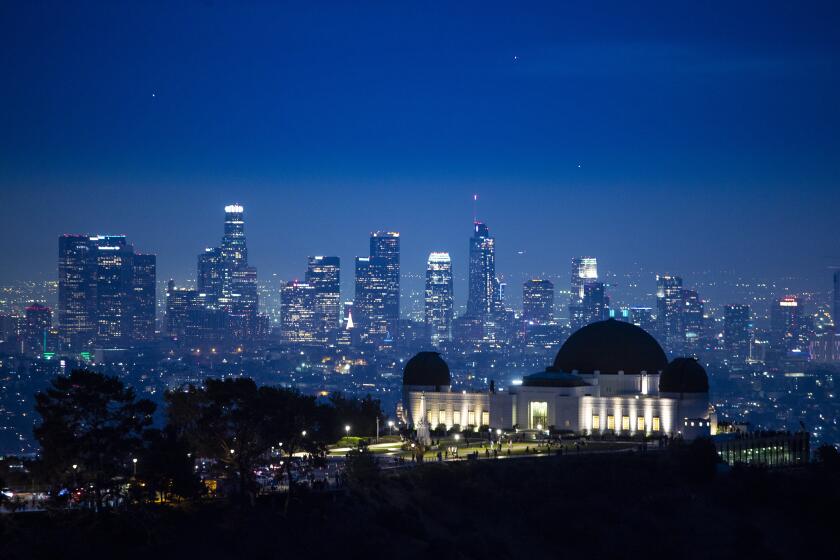Fossil fuel money is toxic for some L.A. council candidates
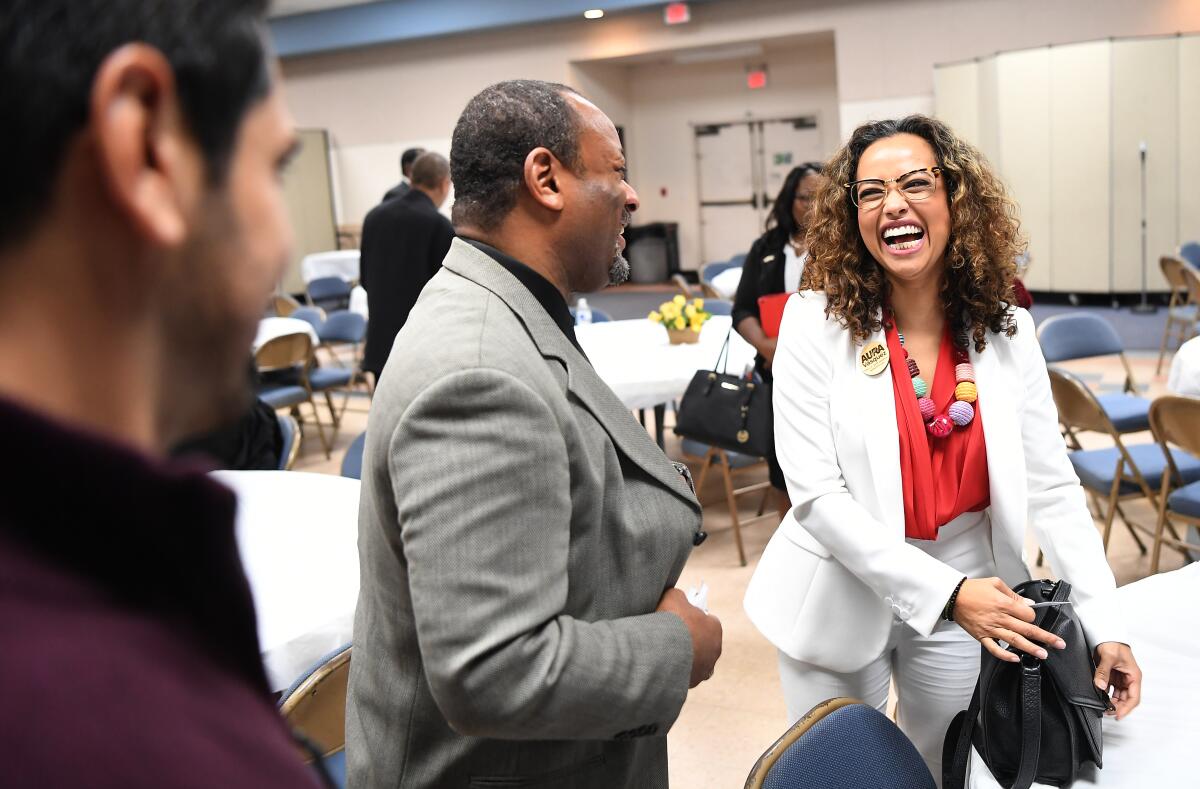
- Share via
Determined to set themselves apart on the issue of climate change, candidates for Los Angeles City Council are refusing to accept campaign contributions from fossil fuel companies and their executives — and criticizing rivals who won’t make the same promise.
Petroleum dollars have emerged as a political issue in several council contests, in many cases driven by insurgent candidates who have sought to make it a litmus test.
In the race to replace Councilman Herb Wesson, four candidates have publicly promised to forgo fossil fuel donations and badgered longtime county Supervisor Mark Ridley-Thomas for refusing to do the same.
“He’s going to stand on the side of the fossil fuel industry because he’s taking all their money, instead of standing with the people,” said Aura Vasquez, a former city commissioner who is campaigning on her refusal to accept such donations.
Ridley-Thomas said he has a strong track record on environmental issues, imposing tighter regulations on oil drilling and pushing for greater reliance on renewable energy. Out of more than a thousand contributions, he said, four or five came from fossil fuel-related donors.
“These candidates have sought to make it appear as though somehow I’m quote-unquote owned by Big Oil, when in fact it is completely false,” he said. “It’s unsubstantiated, and it’s another attempt to mislead voters.”
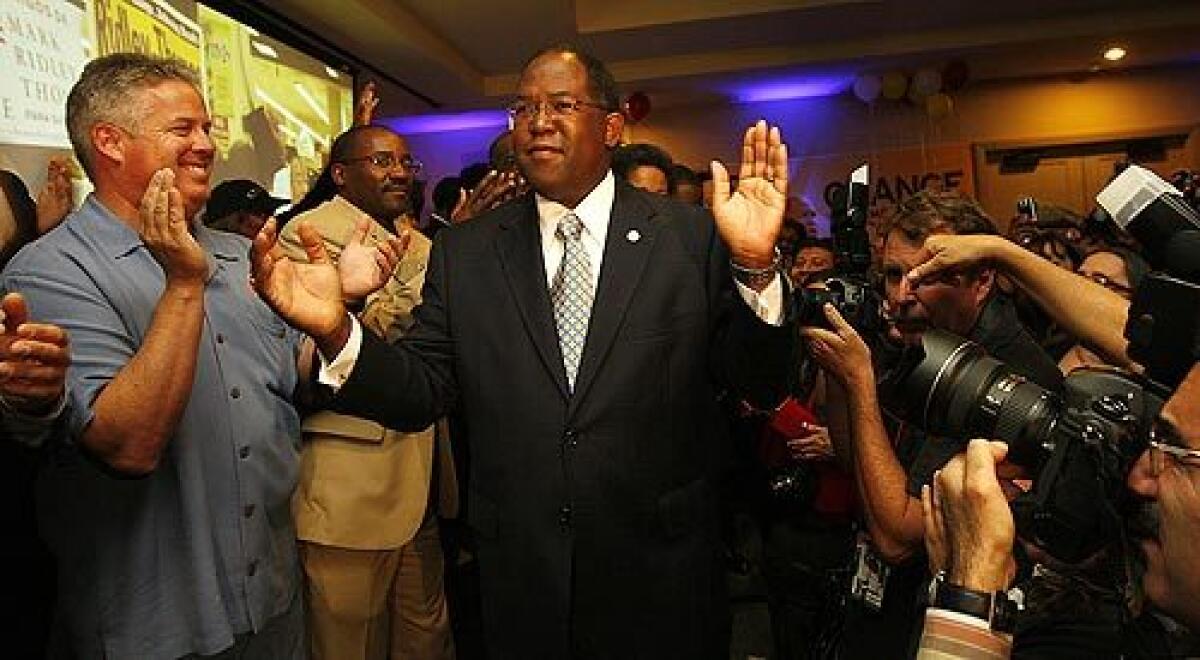
Fossil fuel interests have not historically been the biggest spenders in L.A. city campaigns, which have long been dominated by the real estate industry and public employee unions. The growing attention to oil and gas money at City Hall is a reflection, in part, of increased activism around the impacts of oil drilling — both at the neighborhood level and for the planet.
In the northwest San Fernando Valley, college educator Loraine Lundquist has sworn off oil and gas donations and criticized her opponent, Councilman John Lee, for accepting them.
In two other council districts — one covering part of the Eastside, the other stretching from Sherman Oaks to Silver Lake — nearly every candidate has signed a pledge swearing off donations over $200 from oil and gas companies’ executives, lobbyists and political committees.
Thousands of candidates across the U.S. have signed that pledge, including state Sen. Holly Mitchell (D-Los Angeles), one of the contenders vying to replace Ridley-Thomas on the county Board of Supervisors. Another candidate in that contest, former City Councilwoman Jan Perry, has promised not to take fossil fuel contributions and criticized Wesson, one of her rivals, for accepting such donations.
The debate around fossil fuels doesn’t just focus on money. In the race to represent Wesson’s Koreatown-to-Crenshaw district, four candidates have called for the city to phase out oil drilling within 2,500 feet of homes and schools. Doing so would shutter most of the active wells in Los Angeles, according to a city analysis.
Ridley-Thomas, who joined the Board of Supervisors in 2008, opposes the idea of a citywide buffer, warning it could expose taxpayers to costly lawsuits. L.A.’s petroleum administrator concluded last year that approving a smaller buffer around wells — 600 feet — could cost the city more than $700 million in legal bills, cleanup costs and other expenses, a figure contested by some environmental advocates.
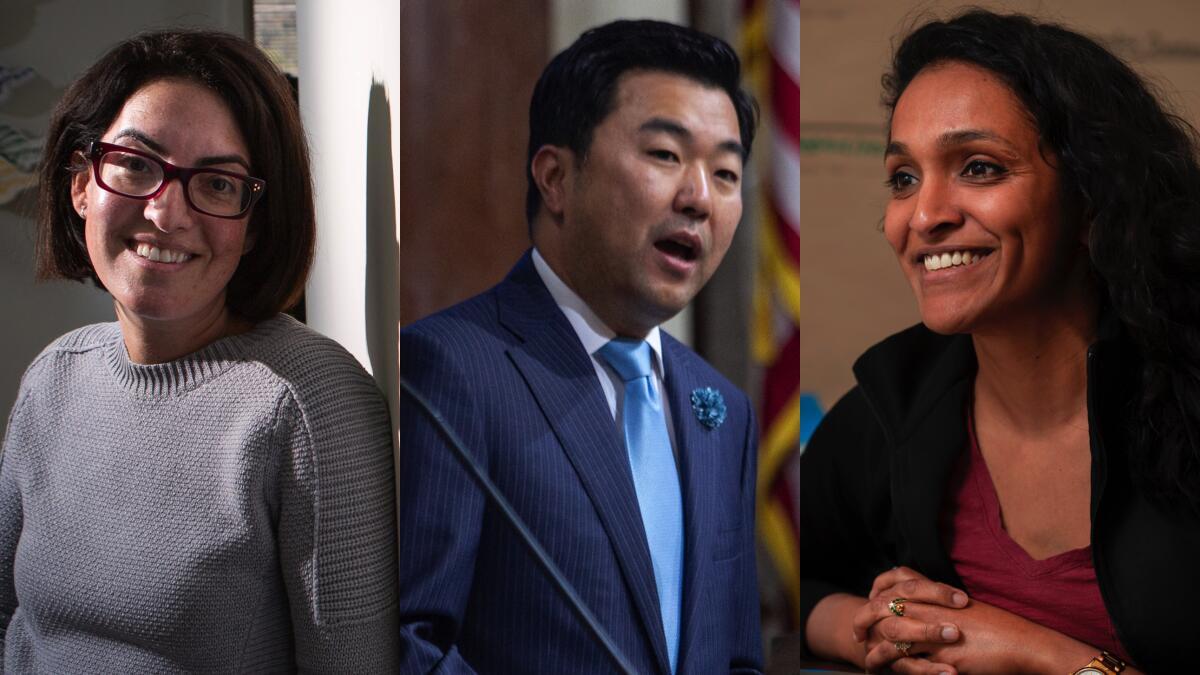
Ridley-Thomas said government agencies have multiple tools for regulating drilling sites, including air quality testing and long-range health assessments of the surrounding community. In 2011, he backed a legal settlement that included such measures for the Inglewood Oil Field, a facility in his district.
At one candidate forum last month, an anti-drilling activist asked Ridley-Thomas and his rivals if they are taking money from oil companies. Candidates Grace Yoo, Channing Martinez, Melvin Snell and Vasquez all said they are not.
Ridley-Thomas did not directly answer the question, instead telling the crowd he has a clear record on environmental issues. “That’s why the League of Conservation Voters endorsed me,” he said. “They’re not concerned about the relatively small amount —”
“Yes or no?” people shouted from the crowd.
“Oh my God,” Ridley-Thomas responded. “It’s a matter of public record!”
By mid-February, Ridley-Thomas had accepted $800 from an executive with the oil and gas company California Resources Corp. and $800 from the company itself; $800 from E&B Natural Resources Management, which operates a drill site in the district; and $800 from the California Independent Petroleum Assn.
Rock Zierman, CEO of the petroleum association, said workers in the oil industry are constituents too — and have a “vested interest in supporting candidates who have a vision for a vibrant Los Angeles.”
Environmentalists argue that such donations are revealing, even when small amounts of money are at stake. “It signals who the fossil fuel industry thinks is going to be friendly to them,” said John Kerin of Sunrise Movement Los Angeles, the local branch of a youth-led coalition pushing for action on climate change.
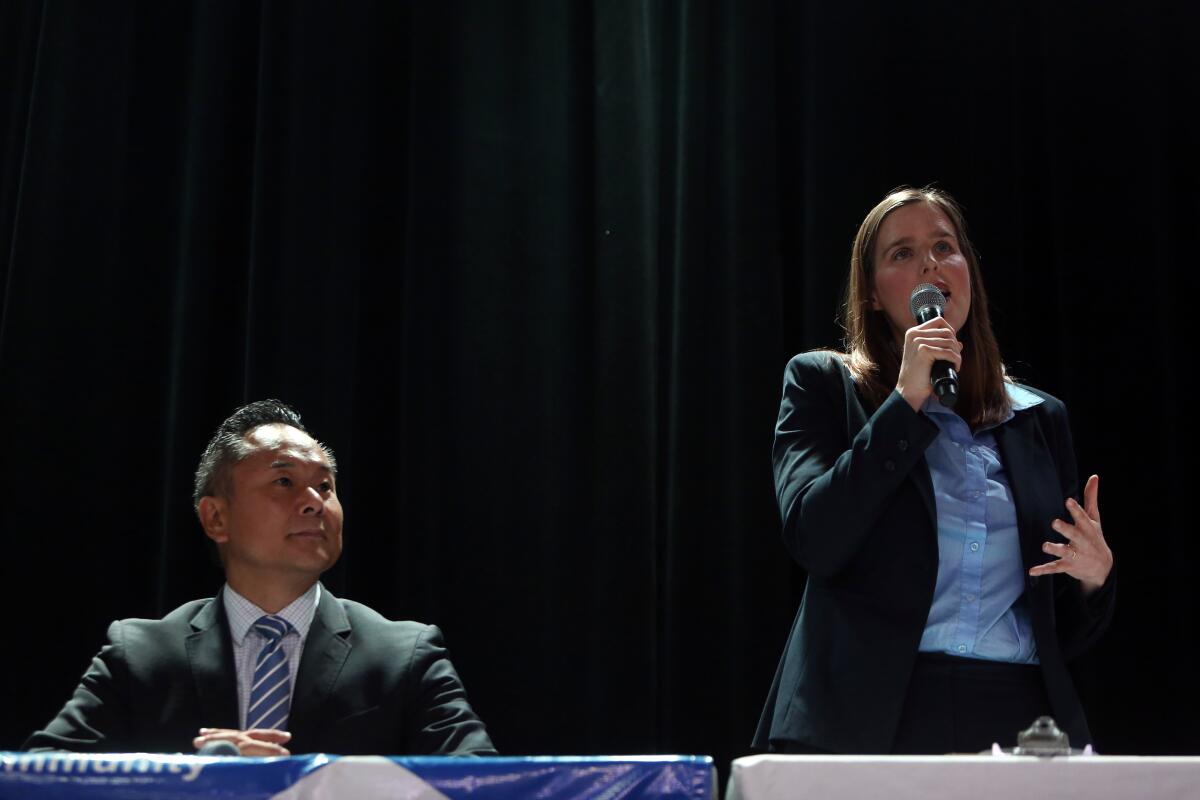
Sunrise Movement L.A. has endorsed Vasquez in the race to replace Wesson. The group is also supporting Lundquist in the northwest Valley, where thousands were displaced by the Aliso Canyon methane disaster in 2015.
When Lee and Lundquist went head to head in a special election last year, Lundquist criticized Lee over tens of thousands of dollars given by petroleum companies to an independent committee backing his candidacy. Lee, in turn, accused Lundquist of hypocrisy because one of her biggest financial supporters has invested in fossil fuel companies.
In their rematch for the seat this year, the oil and gas company California Resources Corp. gave $95,000 this month to an independent committee backing Lee. The councilman has also received more than $6,000 in campaign contributions from fossil fuel companies, industry groups and their employees since the fall.
Lee said he should be judged on his actions, including a resolution urging Gov. Gavin Newsom to speed up the shutdown of Aliso Canyon, rather than “meaningless purity tests.” Still, he returned two campaign donations from executives with the Termo Co., which has operated wells at the Aliso Canyon site, saying it would be “inappropriate” to take that money.
“I reject any notion that a single industry has influence over my campaign,” Lee said.
Lundquist said the fossil fuel pledge represents “a commitment to science” and is needed to root out “the corrupting influence of oil and gas money.”
“Restoring community trust in our leaders to actually shut down Aliso Canyon, curb pollution and move in the right direction starts with simply saying no to money from the oil and gas industry,” Lundquist said.
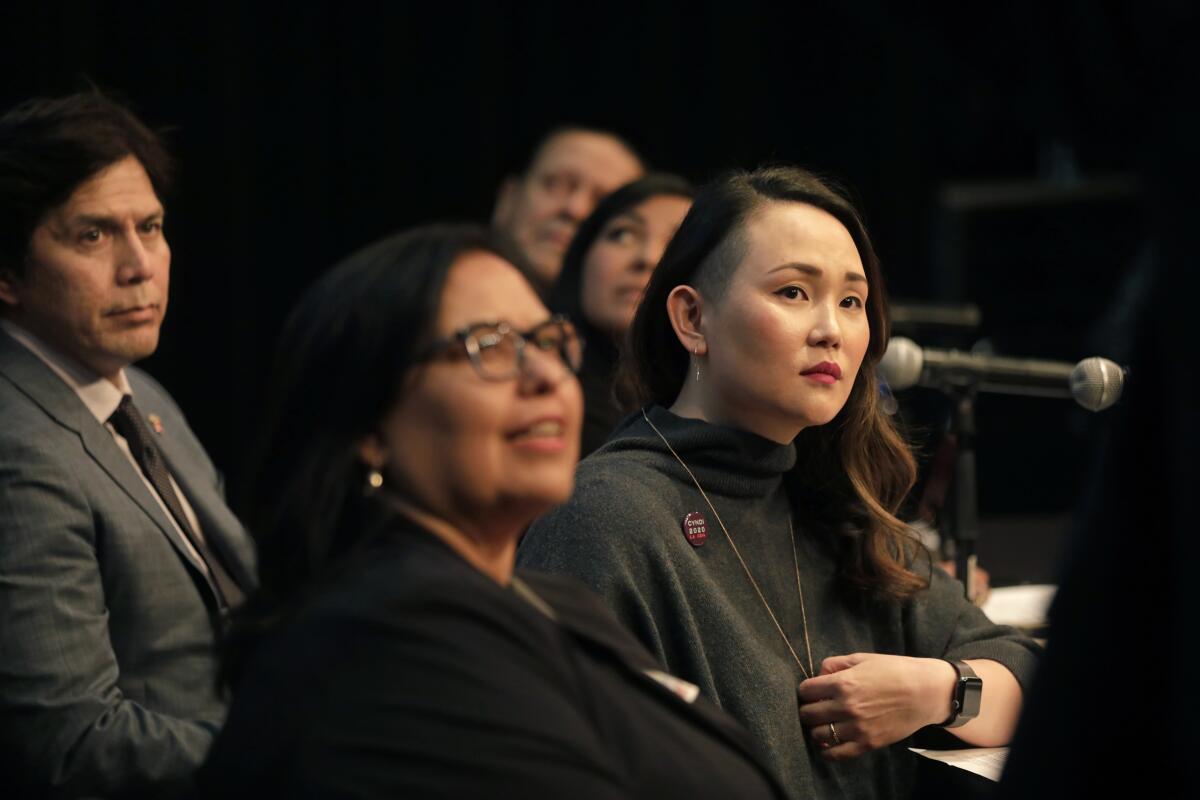
In the contest to replace Councilman Jose Huizar in a downtown-to-Eagle Rock district, four out of five candidates have signed the fossil fuel pledge. And in a district that stretches across the Hollywood Hills, Councilman David Ryu and his two challengers on the ballot — nonprofit leader Nithya Raman and screenwriter Sarah Kate Levy — have signed it too.
Still, Raman has chided Ryu for asking SoCalGas — which has opposed government efforts to replace natural gas with electricity — to contribute $5,000 to an Asian American cultural celebration in 2018. SoCalGas is “trying to buy influence at City Hall,” said Raman, who is backed by Sunrise Movement L.A.
Daniel Eyal, Ryu’s deputy campaign manager, said the councilman solicited the SoCalGas donation a year and a half before he signed the pledge, which does not apply to charitable donations. Eyal also pointed to Ryu’s endorsements from the Sierra Club and the Los Angeles League of Conservation Voters.
Nevertheless, Ryu won’t ask fossil fuel interests for such charitable contributions from now on, Eyal said.
Times staff writers Maloy Moore and Dakota Smith contributed to this report.
Sign up for Essential California
The most important California stories and recommendations in your inbox every morning.
You may occasionally receive promotional content from the Los Angeles Times.









